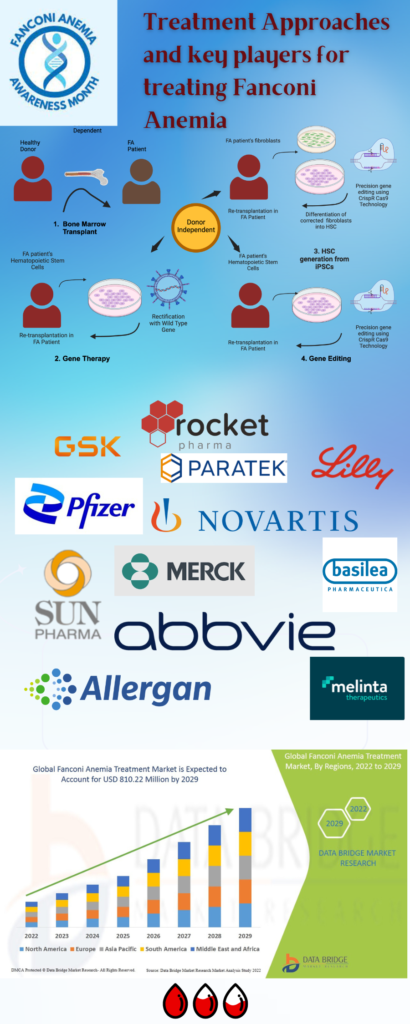Fanconi anemia (FA) is a rare genetic disorder characterized by bone marrow failure, birth defects, and a heightened risk of cancer. Symptoms typically emerge around age 7, though diagnosis may occur later when cytopenia is detected. The disorder’s average lifespan is between 20 and 30 years, with most patients developing bone marrow failure (BMF) by age 15, and a significant risk of myelodysplastic syndrome (MDS) or acute myeloid leukemia (AML) later in life.
Currently, hematopoietic stem cell transplantation (HSCT) is the main treatment option for FA, but it comes with limitations such as donor availability and significant risks, including the development of secondary cancers. As an alternative, gene therapy is gaining traction and involves introducing a functional version of the mutated gene using viral vectors. Additionally, Crispr based gene editing also can be used as an approach for correcting the mutation shows great promise in targeting the wild-type FANCA gene in FA-A cells (see figure). Recent advancements in mRNA technology offer potential in FA treatment where it can serve as a replacement therapy or be used in cell therapy by modifying cells ex vivo and reintroducing them into the patient. However, challenges remain in terms of repeated administration, tissue targeting, and stability.
Rocket Pharmaceuticals in early April 2024 announced the acceptance of RP-L102 marketing authorization application by the European Medicines Agency. RP-L102 is a “lentiviral vector (LV) based investigational gene therapy for FA complementation group A “.This open label phase II clinical trial NCT04248439 aims to assess the efficacy of a LV based treatment involving the infusion of autologous CD34+ cells, which have been enriched and transduced ex vivo with a lentiviral vector carrying the FANCA gene. The primary objective is to evaluate the patients’ resistance to mitomycin-C (MMC), a marker of bone marrow cell correction. The trial, which has now completed enrollment of 12 patients from the U.S. and EU, targeted individuals aged ≥1 year with FANCA mutations and without an HLA-matched sibling donor. Patients were required to have at least 30 CD34+ cells/µL in bone marrow to be eligible. The procedure involved collecting peripheral blood mononuclear cells via leukapheresis, enriching CD34+ cells, transducing them with the FANCA gene-carrying lentiviral vector, and infusing them intravenously back into the patient, all without cryopreservation or conditioning.
Preliminary results from April 2022 indicated that 12 patients aged 2 to 6 years received the treatment. Sustained engraftment could be observed in six out of nine evaluable patients with ≥12 months of follow-up, along with increasing MMC resistance in bone marrow colony-forming cells and concurrent hematologic stabilization. Genetic correction was demonstrated in most patients, and no serious adverse effects related to the treatment was reported, except for one transient Grade 2 infusion-related reaction thus showing promising results in terms of safety and efficacy, with increasing evidence of genetic and phenotypic correction and progressive engraftment of gene-corrected cells without the need for conditioning. Some of the major players operating in the Fanconi anemia treatment market are Allergan, Merck & Co., Inc., Pfizer Inc., Melinta Therapeutics LLC, Basilea Pharmaceutica Ltd., Tetraphase Pharmaceuticals, Paratek Pharmaceuticals, Inc., AbbVie Inc., and Eli Lilly and Company, among others.

Figure 1: Treatment and key players in treating Fanconi Anemia, Image Source: Malini Gupta
Data Bridge Market Research analyses that the FA treatment market was valued at USD 520 million in 2021 and is expected to reach USD 810.22 million by 2029, registering a CAGR of 5.70% during the forecast period of 2022 to 2029.
Dr. Malini Gupta, Ph.D.
Sources
- https://clinicaltrials.gov/study/NCT04248439
- Figure inspired from: Beyond current treatment of Fanconi Anemia: What do advances in cell and gene-based approaches offer? Elena Martínez-Balsalobre et al, Blood Reviews July ,2023
- All logos for the “key players” in the figure have been downloaded from their respective websites
- Lentiviral-mediated Gene Therapy for Patients with Fanconi Anemia [Group A]: Updated Results from Global RP-L102 Clinical Trials, A. Czechowicz et al, Blood (2022) 140 (Supplement 1): 10646–10647.



